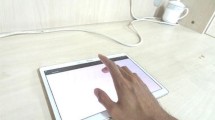Abstract
Many physically challenged users cannot interact with a computer through a conventional keyboard and mouse. For example, spasticity, amyotrophic lateral sclerosis and cerebral palsy confine movement to a very small part of the body. People with these disorders may interact with a computer through one or two switches with the help of a scanning mechanism. Scanning is the technique of successively highlighting items on a computer screen and pressing a switch when the desired item is highlighted. We have developed a new scanning system that works by clustering screen objects in a graphical user interface (GUI). Currently we have implemented it for Microsoft Windows operating system, however it can be extended to any other GUI based operating systems. In a previous paper we compared the cluster scanning system with other scanning systems using simulation (Biswas and Robinson, 2008a). In this paper we validate the results obtained in simulation by evaluating the cluster scanning system through a controlled experiment with motor impaired users. We describe the scanning systems and results obtained using simulation in the following two sections. In Section 11.4, we present our study followed by concluding remarks.
Access this chapter
Tax calculation will be finalised at checkout
Purchases are for personal use only
Preview
Unable to display preview. Download preview PDF.
Similar content being viewed by others
References
Biswas P, Robinson P (2008a) A new screen scanning system based on clustering screen objects. Journal of Assistive Technologies, 2(3): 24–31
Biswas P, Robinson P (2008b) Automatic evaluation of assistive interfaces. In: Proceedings of International Conference on Intelligent User Interfaces (IUI’08) , Canary Islands, Spain
Ntoa S, Savidis A, Stephanidis C (2004) FastScanner: an accessibility tool for motor impaired users. In: Proceedings of the 9th International Conference on Computers for Handicapped Persons (ICCHP 2004), Paris, France
Ross TJ (1997) Fuzzy logic with engineering application, international edition. Mcgraw-Hill, NY, US
ScanBuddy (2007) The ScanBuddy System. Available at: www.ahf-net.com/Scanbuddy.htm (Accessed on 21 May 2007)
Steriadis CE, Constantinou P (2002) Using the scanning technique to make an ordinary operating system accessible to motor impaired users. The autonomia system. In: Proceedings of the International ACM SIGACCESS Conference on Computers and Accessibility (ASSET 2002), Paphos, Cyprus
Super-Switch (2007) Available at: http://rjcooper.com/super-switch/index.html (Accessed on 19 November 2009)
Author information
Authors and Affiliations
Editor information
Editors and Affiliations
Rights and permissions
Copyright information
© 2010 Springer-Verlag London Limited
About this paper
Cite this paper
Biswas, P., Robinson, P. (2010). Evaluating the Cluster Scanning System. In: Langdon, P., Clarkson, P., Robinson, P. (eds) Designing Inclusive Interactions. Springer, London. https://doi.org/10.1007/978-1-84996-166-0_11
Download citation
DOI: https://doi.org/10.1007/978-1-84996-166-0_11
Publisher Name: Springer, London
Print ISBN: 978-1-84996-165-3
Online ISBN: 978-1-84996-166-0
eBook Packages: EngineeringEngineering (R0)




